- News
- Reviews
- Bikes
- Accessories
- Accessories - misc
- Computer mounts
- Bags
- Bar ends
- Bike bags & cases
- Bottle cages
- Bottles
- Cameras
- Car racks
- Child seats
- Computers
- Glasses
- GPS units
- Helmets
- Lights - front
- Lights - rear
- Lights - sets
- Locks
- Mirrors
- Mudguards
- Racks
- Pumps & CO2 inflators
- Puncture kits
- Reflectives
- Smart watches
- Stands and racks
- Trailers
- Clothing
- Components
- Bar tape & grips
- Bottom brackets
- Brake & gear cables
- Brake & STI levers
- Brake pads & spares
- Brakes
- Cassettes & freewheels
- Chains
- Chainsets & chainrings
- Derailleurs - front
- Derailleurs - rear
- Forks
- Gear levers & shifters
- Groupsets
- Handlebars & extensions
- Headsets
- Hubs
- Inner tubes
- Pedals
- Quick releases & skewers
- Saddles
- Seatposts
- Stems
- Wheels
- Tyres
- Health, fitness and nutrition
- Tools and workshop
- Miscellaneous
- Tubeless valves
- Buyers Guides
- Features
- Forum
- Recommends
- Podcast
feature
The stuff they never tell you about rim brakes: should you stick with tradition or switch to disc brakes?
Whether you should choose rim brakes or disc brakes is a big issue for more and more people these days with the bike market becoming mixed at ever-lower price points. We’ve run an article in the past about why you might want to think twice before going all-in with disc brakes, so we thought it fair to redress the balance by pointing out the hassles associated with rim brakes too…
> 8 reasons not to get disc brakes — find out the hassles before you switch
They’ll wear out your rims
Braking causes wear – you can’t get away from that fact. You can, though, decide which components get worn. With disc brakes, it’s relatively inexpensive and easy to replace the rotors, but with rim brakes, it’s the sidewalls of your rims. That might not be a big deal if you’re running cheap wheels and you don’t rack up big miles, but it can get you down if you’ve just invested a lot of money in a set of posh new hoops.
> How to tell when your wheel rims have worn out — and how to make them last longer
How long you can expect a rim to last? Shimano's Ben Hillsdon says, "It's difficult to say because it depends on the force of your braking and the cleanliness of your pads and your rim. If you can avoid excessively dragging the brakes and if you clean your bike regularly, paying particular attention to the braking track on the wheels and the face of the brake pad you'll significantly extend the life of your wheels."
Not all rims are the same either. Manufacturers will sometimes use a thin sidewall to reduce weight, but that’ll affect longevity.
Wheel manufacturers make rims from aluminium because it’s lightweight and the coefficient of friction doesn’t drop to the same extent as steel when it gets wet, but the aluminium alloys used are relatively soft and wear much faster.
Carbon fibre rims usually have a layer of material laid over the brake track to give a good braking performance, prevent heat buildup and prolong the life of the rim. Underneath this top layer is the raw carbon weave.
Hunt's Ollie Gray says, “Carbon brake tracks are much more resilient than alloy braking surfaces and generally will not show the same bowing/caving that alloy surfaces do. Whilst they will curve inwards to a degree, this is not normally the tell-tale. What you should look for instead is when the woven fibres of the carbon itself begin to become exposed or frayed.”
They don’t work well in the wet
Water on the road quickly gets transferred to your wheel rims while you’re riding so rim brakes don’t work as well in wet conditions. Water on any braking surface reduces friction and affects performance. The coefficient of friction with normal brake pads and an aluminium braking surface doesn’t drop as radically as it does with steel, but it’s still significant.
Disc brakes are affected by wet conditions too, but not as badly. Fixed to your hubs, disc brake rotors are further from the road surface than your rims and they don’t get covered in as much spray or mud.
Braking on carbon is… variable
The use of carbon fibre allows manufacturers to make lightweight and/or aero rims but you don’t get the best braking surface.
“If your wheels have carbon braking surfaces, you have to take some special considerations into account,” warns Canyon. “Most importantly, only use brake pads suitable for carbon wheels.
“We recommend brake pads made by or recommended by, the wheel manufacturer. Carbon brake pads usually wear out faster than conventional brake pads. In addition, the rims have weaker braking performance than aluminium rims, especially in wet conditions.”
Admittedly, braking on carbon rims has got a lot better since the early days. It used to be dreadful with little consistency, but manufacturers have gradually improved things.
In his recent review of Hunt’s 36 UD Carbon Spoke Wheelset on road.cc, Jamie Williams said, “Carbon braking surfaces have come a long way over the last decade, and here the braking is consistent without any surprise 'snatching', although as with all carbon wheelsets it does take a rotation or two to clear off water when conditions are wet.”
Hunt uses what it calls a Griptec basalt ceramic fibre brake-track to provide extra friction, Campagnolo has its All Conditions Carbon Control (AC3) technology which results in a textured braking surface, and other brands have their own tech, all of which leads to better braking, but it’s never as good as on aluminium.
One other issue with carbon that people sometimes mention is that heat produced by braking could cause the resin to soften, affecting the rim’s structural integrity. In the real world, though, this virtually never happens, not even to heavy riders descending steep mountains in high temperatures.
Brake pads can be expensive
Considering that they weigh just a few grams each and wear out pretty quickly, brake pads can be expensive. A pair of Zipp’s Tangente Platinum Pro Evo brake pads retail at £41, for example – and you’re going to need two pairs.
You need to choose the right brake pads
You need to select the right brake pads too. Most importantly, you need to get the right pads for the rim material: carbon or aluminium.
Beyond that, though, some brands suggest that particular pads will work best with their wheels, and different types of pads suit different conditions.
“There are a few variables to consider but on a basic level: softer compound pads, which offer greater modulation and are best used during the dry/summer months, won’t deteriorate the rim’s braking surface as much as they’ll deteriorate themselves,” says Hunt’s Ollie Grey. “Harder pads are better for year-round riding, but owing to their firmer compounds will cause more wear on the braking track over time."
You need to look after those brake pads
Stones, glass, and other debris from the road can sometimes get embedded in the compound of your brake pads. If you don’t notice it, this can damage the rim – gouging the braking surface – and affect the braking performance.
You need to remove the wheel to get a proper look at the surface of the brake pad. If you spot anything stuck in there you need to prise it out with tweezers.
Rim brake wheel tech is stalling
While disc brake development continues apace, there’s not a lot happening in the rim brake market.
The same is true of the wheels that are used with each. Many high-end wheels are released only for use with disc brakes these days. There’s no such thing as rim brake version of the Roval Rapide CLX or Zipp 353 NSW, for example.
Designers often say they like the fact that they don’t need to incorporate a brake track into a new aero wheel because it gives them freer rein in their efforts to reduce drag.
Of course, plenty of high-end wheels are still released in both rim brake and disc brake formats, but the market is clearly moving in only one direction.
Tyre size is limited
With disc brakes, your maximum tyre size is dictated by your frame and fork but with rim brakes, you have the additional limitation of the calliper. Most modern rim brake callipers take a maximum tyre width of 28mm, for example, so all-road and gravel riding aren’t open to you.
> 46 of the best road bike tyres 2021 - rubber for speed, durability and puncture resistance
Rim brakes can rub and squeal too!
People often moan about disc brakes making loads of horrible noises, but rim brakes can rub and squeal too.
Luckily, it’s usually easy to stop the brake pads rubbing on the rims by re-centring the calliper or altering the cable tension via the barrel adjuster, and many noises can be cured with simple maintenance, like toe-ing in the pads.
How to replace your road bike's rim brake pads
Slight wheel imperfections can be a big deal
A rim going slightly out of true during a ride isn’t a big deal if you’re using disc brakes. You might not even notice for a while.
You’ll notice pretty quickly with rim brakes. Braking will become inconsistent as the contact between the rim and the pad varies during the wheel’s rotation.
If your wheel goes a long way out of true you might get a knocking between the rim and the pad even when you’re not braking, and that’s really bad news.
Cable run is imperative to performance
Cable run makes a big difference to the performance of any cable-operated brakes – which includes some disc brakes as well as the vast majority of rim brakes.
Steel cables don’t like sharp corners which is a problem if you want fully internal cable routing with nothing showing anywhere between the lever and the calliper. The more convoluted the routing, the spongier the brakes feel.
Hydraulic brakes – which include some rim brakes, but not many – don’t care much about tight turns. You want to run the hose inside the handlebar, take a hard left into the stem, flip directly down into the fork steerer… and so on? Not a problem.
Everyone seems to want the clean look and slight aero benefit of internal cable routing these days. This is possible with rim brakes and traditional cables – the Trek Madone 9 Series we reviewed a few years ago had virtually no cable showing, for example, but this is far, far easier to achieve with hydraulic brakes.
Mat has been in cycling media since 1996, on titles including BikeRadar, Total Bike, Total Mountain Bike, What Mountain Bike and Mountain Biking UK, and he has been editor of 220 Triathlon and Cycling Plus. Mat has been road.cc technical editor for over a decade, testing bikes, fettling the latest kit, and trying out the most up-to-the-minute clothing. He has won his category in Ironman UK 70.3 and finished on the podium in both marathons he has run. Mat is a Cambridge graduate who did a post-grad in magazine journalism, and he is a winner of the Cycling Media Award for Specialist Online Writer. Now over 50, he's riding road and gravel bikes most days for fun and fitness rather than training for competitions.
Latest Comments
- David9694 17 min 29 sec ago
Joey Baptiste pleads guilty over Ferrari crash in Norwich...
- rct 25 min 37 sec ago
IIRC Beds and TV share traffic policing resources.
- panda 27 min 10 sec ago
I'm just giving some context so that the argument you make can be made. I'm also on your side so tone down the "... , have you?" attitude at the...
- Josh Price 28 min 40 sec ago
Interesting point! Thanks for bringing that one up Rendel.
- Rich_cb 33 min 23 sec ago
Given they've barely scraped a profit they must be glad the government haven't lumbered them with some big tax increases for next year...
- Pub bike 50 min 34 sec ago
Also aero is not going to make enough difference on steep descents. A fully loaded touring bike will do 90kmh down a steep enough hill.
- the little onion 59 min 27 sec ago
This says a lot more about the Mail than about Mr van Erp....
- Hirsute 1 hour 3 min ago
My MiL broke her wrist when scraping ice off the car, she slipped and went straight down very quickly on to her wrist....
- muhasib 1 hour 26 min ago
The designer Ben Meir has said they started with a blank piece of paper and went from concept to prototype in 7 weeks....
- OldRidgeback 1 hour 59 min ago
The same goes for racists and homophobes. They know they can't get away with being racist or homophobic any more. So they pick on cyclists instead....
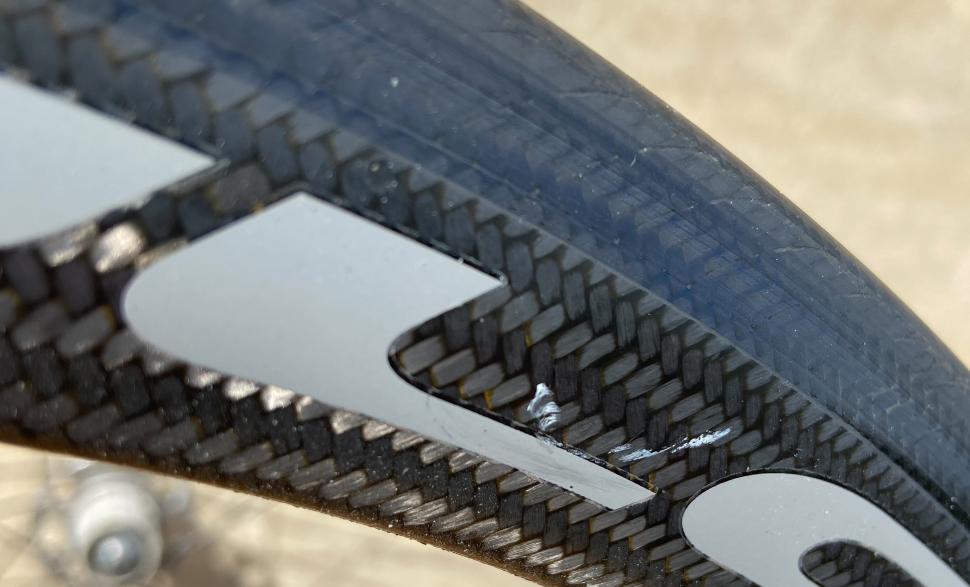
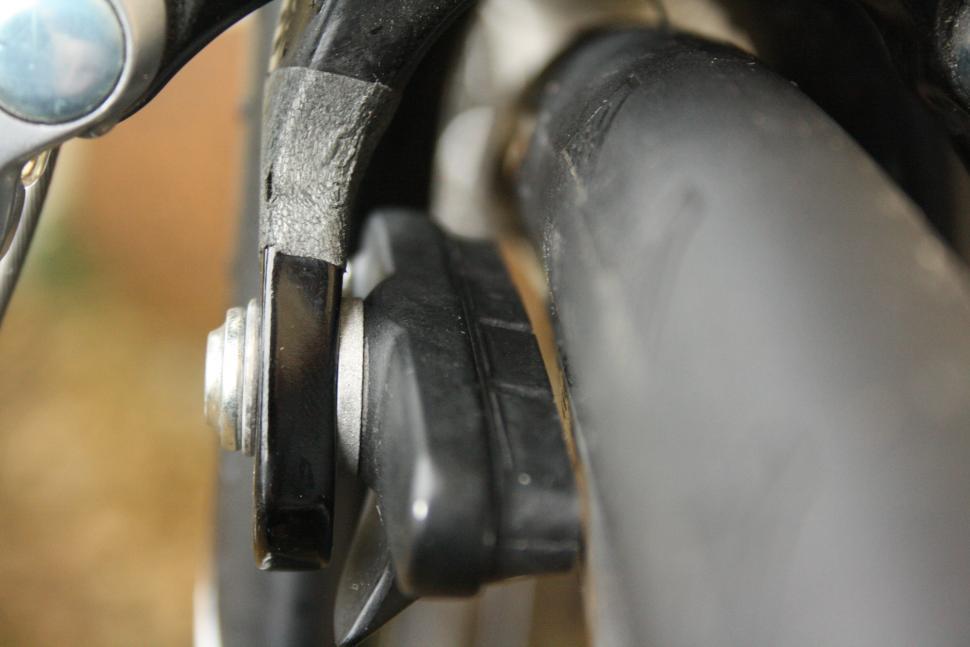
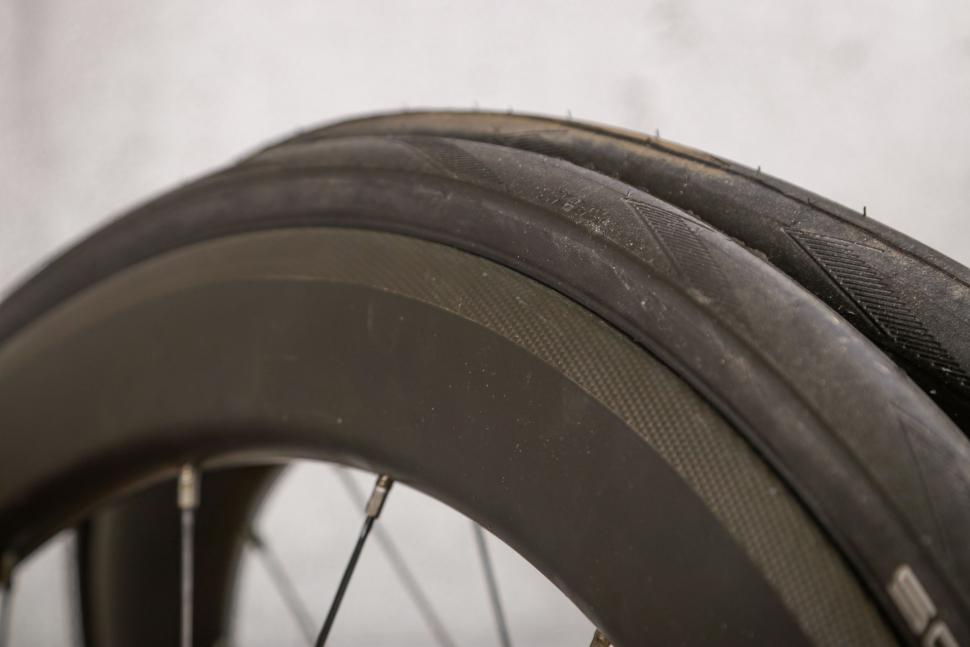
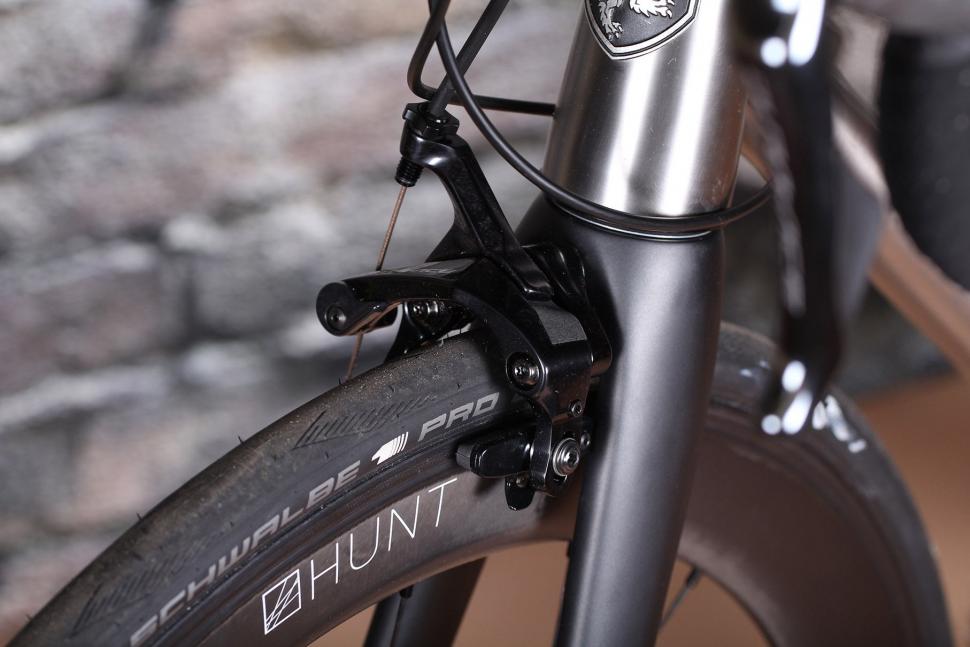

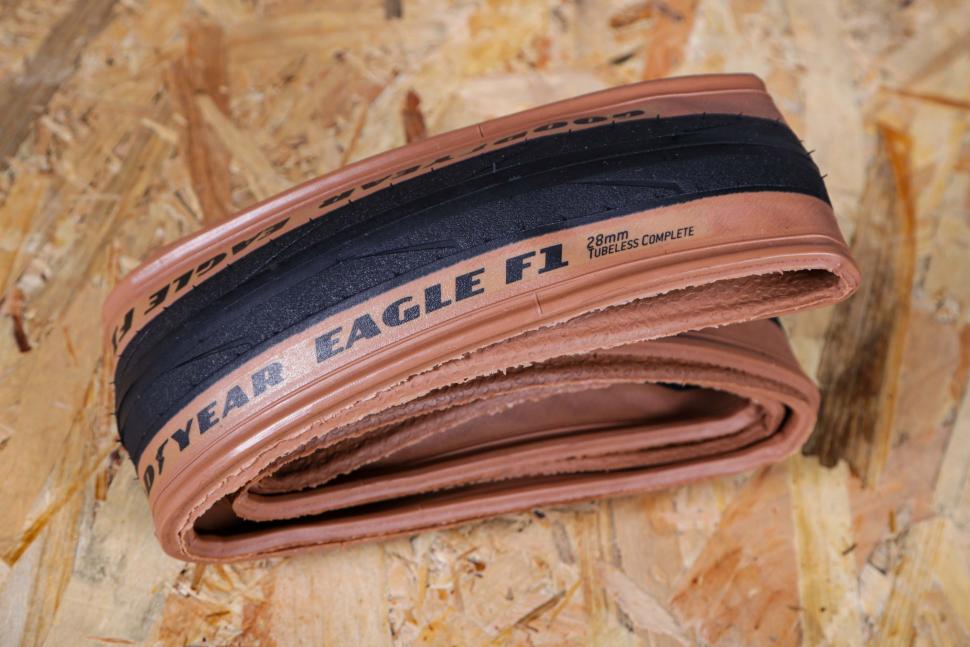
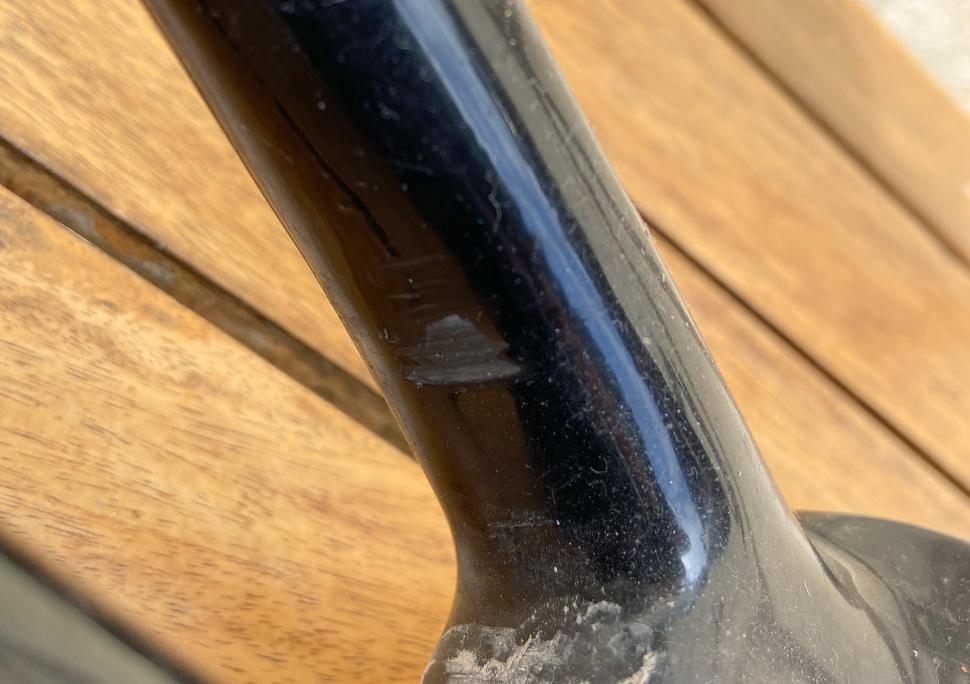
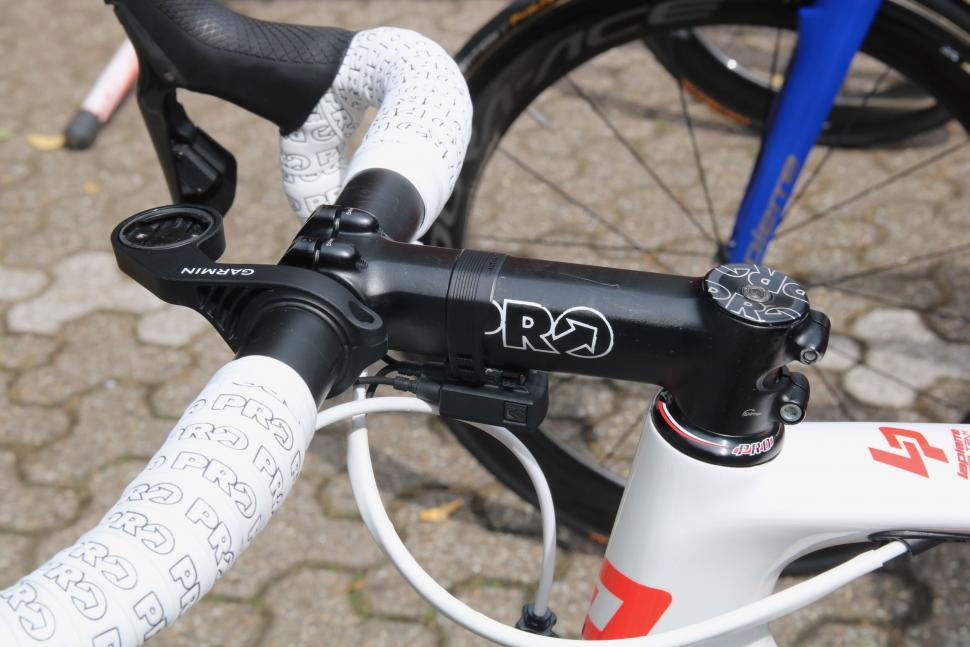
Add new comment
52 comments
This article needs taking apart much like most roadie owners of disc brakes need to take apart their set-up to investigate the latest bind; it is more full of holes than the wallet of someone whose brifters have failed after just a few years. (My Campag d/t shifters, in regular use, work fine - there is no such thing as a 40 year old brifter, nor, I predict, will there ever be.)
Still, if adding complexity, weight and expense are your thing...it all offsets the weight gain from those pricey CF rims. That bleed kit looks like a lot of faff - no, just my third-hand, pliers and a 5mm.
I'm a real sucker for Casiraghi style translucent cable outers - oh, what's that, any colour so long as it's black for hydraulic hose? Well, it's practical at least, doesn't show the dirt.
At Spa Cyles, I make it £194.50 to get a pair of brake levers, d/t gear levers, cables (black, of course) and 105 calipers; £455 for the brifter / disc equivalent. Still, it's your money.
"Expensive consumables" - so cite some exotic Zipp product as your proof. Reality: £8 a pair of basic Shimano rim pads and £20 for standard disc pads.
"less effective in the wet" or rather disc brakes will get your 28s into a skid - if you do want to shell out at something like the cost of disc pads, the relevant Swisstop pads help a lot and keep the rim wear down too
"Tyre size is limited" - this is re road bikes right, so with short-reach calipers you are fine with 28s and if you're artful about it, you can run P35 mudguards as well. Let me know how it's going majorly fettling your stays around your disc brakes and the randomly placed bosses.
You can have long-reach calliper brakes, or even cantis, but why let full fact get in the way of a good headline?
Slight wheel imperfections can be a big deal - please don't tell me disc brake owners allow their wheels to drift out true??
Rim brake wheel tech is stalling - or rather alu rims were perfected years ago - you just chose how heavy you want them. Oh sorry, I'm forgetting a lot of you like to buy your wheels ready-made from a factory - yes I've got a pair of Hunts and Mavics, but I've DIY-ed several 3x, 32h wheel-sets now. Sapim Race for the front and a blend of Sapim Strong and Race for the rear.
CF for wheels all seems a bit newfangled to me - it would be interesting to see across a large sample over time which need retiring first: out of disc/CF and alu/rim.
Cable run is imperative to performance - well, quite. some tourists who run handlebar bags (2023 = bike packing) did prefer the aero setup when it came out. But you want to see those translucent cable outers, right?
So I'll keep my Reynolds tubing, inner tubes, threaded b/b and rim brakes; but sign me up for helpful innovations like Conti 5000s, SPD, 10s transmission, Cambium tape; hell, I even run a CF handlebar with an aero stem on an 1" to 1 1/8" adaptor.
My slight imperfection was a slightly proud joint that I never really bothered about until on a steep, wet descent it caused a loss of control under heavy braking and I had to throw myself off my bike, nearly dislocating my shoulder, to avoid a header into a stone wall at over 30mph.
Many a rim brake rider has had to open their brake release after a wheel has taken a hit.
Carbon rims generally don't stop in the wet, and ALU rims may or may not work. Disk brakes may squeal in the wet but soon clean up. I have no problem with over-braking on disc brakes in the wet, but the long drop non-series Shimano brakes on my Tiagra were pretty ineffective in the wet regardless of pads - even though winter use ate the rims in no time.
I agree with some of your other points but I do know that Jagwire, for one, offer hydraulic brake hoses in a range of 12 different colours.
It's august 2021 and disc brakes have yet to win a Grand Tour
That's because they're so good at stopping you!
They used to say the same thing about Shimano equipped bikes in the TdF. Shimano didn't cross the line first 'till He-who-must-not-be-named cheated his way to his first victory. It'll happen because manufacturers' R&D is now going into disc-break frames while rim break tech' is unlikely to have had any real development cash spent for a few years now. I've only had two bikes in the last 25 years both with rim breaks so I'm not really sure what all the fuss is about. The oldest of the two must have done thousands of miles and still runs on it's first and only set of rims while the second's only got an upgrade 'cos the hub wouldn't take those new fandagled 11 speed cassette things.
Yet to exclusively win a Grand Tour. Pogacar rode more Kms on discs than rims at the Tour.
The important stages, the mountain wins, TTs, were on rims
My (not very informed) view for what it's worth is that disc brakes make much for sense for average rider; while rim brakes more sense for the pros.
My (not very informed) view for what it's worth is that disc brakes make much more sense for the average rider; while rim brakes make more sense for the pros
I'm happy to agree with this- I had to go back to rim brakes while waiting for a replacement for my 'collapsing rim' on the disc bike. The dual-pivot Ultegra rim brakes squeal more and are considerably less effective than the TRP Spyres.
Thats a rather subjective judgement. Define important in way that doesnt refer to which brakes were used.
Arguably the most important stage was the 'sprinters'' stage 3 - when Roglič crashed... and he didn't.
i suppose the only response to this observation is when the first tour will be won on disc brakes, and it will probably be next years'. A silly debate one vs the other. Guess what, purple bikes are faster and we've yet to see a tour win on one.
Riis 1996
Except you're wrong. Discs won the vast majority of the TDF stages this year. Discs won the Green Jersey with a single rider outright and cumulatively the GC too.
https://www.bikeradar.com/features/pro-bike/2021-tour-de-france-stage-wi...
And yet the average speeds have not gone up by more than 1.5 mph since 1963; but wait, the average distanced raced has gone down by over 600 miles since 1963! Tour de France Statistics You Have Not Seen Yet (2023) (cyclistshub.com). This speed thing, and drop in miles ridden, is consistent with other multi-day races as well. If anything, if you consider the lower miles raced, the pro racers are getting worse not better with vastly improved technologies being used, improved training, and improved nutrition.
And of course, the vast majority are riding on disk, it's what the marketing departments want so that we regular idiots will see this and go, "Gee, look, disk brakes won the tour, I got to buy a new bike with disk brakes!" The tour riders, and other races, get the brakes for free, so of course they're going to ride them.
Cycling market forces are using the old NASCAR marketing ploy, whichever car wins on Sunday is sold on Monday, (that car marketing thing died when factory stock cars were no longer used); well now it's whatever bicycle (and gear) wins on Sunday is sold on Monday.
There are literally no other reasons why cyclists today might not go as fast as their amphetamine- and EPO-fuelled forebears who rode in a culture even less concerned with rider safety and recovery than we have today. It's disk brakes, and anyone saying otherwise is a paid shill for Big Disk.
Not to mention that the brake disc is significantly more dangerous to other riders in a crash, than any other part of a bike, such as a cassette.
That's an interesting stat but it doesn't take account of the amount of altitude climbed each year (a figure I can't find, be very interested if anytone knows a source). My impression of following the Tour over the last forty years is that the amount and severity of mountain and hilly stages has considerably increased in recent times (especially hilly stages, very rare to get an out and out flat day these days when, IIRC, there used to be a lot in the 80s/90s), which would have a lot of influence on the average speed, obviously.
are you talking about the people saying "disc brakes never won a tour so discs are rubbish" as a counter argument to regular cyclists who use their bikes in all weathers saying "I prefer discs because I like my brakes to also work when it rains"
What I really like about disc brakes is just how effective and easy to use they are. I've got arthritis in one hand and just don't have the hand strength to use rim brakes safely on a fully loaded tourer with a chubster like me aboard.
I sold my Dawes Galaxy Classic last year because it was just too sketchy on descents. You can apply an hydraulic disc brake with one finger.
Doesn't apply to everyone and I accept that, especially on a road bike, the aesthetics of disc brakes aren't great but sometimes function has to triumph over form.
This should be split into 'buying new bike' vs 'maintaining/upgrading" new bike.
New bike: disc brakes. No downside. No brainier.
Maintenance/upgrade: if you have the rare bike that's already compatible and is still worth a lot maybe upgrade - if the maths work out on cost of upgrade vs residual value of bike. But in most cases just keep what brake type you have. Or sell it and buy a new one with disc brakes.
Disc brakes are not expensive. I've got a 7 year old bike with disc brakes that just went through preventative maintenance check and the verdict on brakes was: nothing to change - just keep using. No reason for the scare stories in this.
Main thing is when washing the bike spray away from the brakes not towards them, to avoid spreading oil or dirt into them.
I've just had to retire a set of rim brake wheels due to wear.
They're 6 years old and mainly used in dry weather, during the same period on my winter bike I've replaced one set of rotors and 3 sets of pads.
For me, disc brakes just make more sense from a maintenance/longevity/cost point of view.
Add in the benefits of wider tyres and I'll never buy a rim brake bike again.
I don't generally care about weight and none of my bikes are particularly aero.
In 6 years on discs I've replaced front pads a couple of times and just the front disc once.
On rim blocks similar period, just for commute rides which are less than half my normal total mileage, must be in double figures at least on rim blocks both front & back, 2 maybe 3 sets per each winter at least, and the wheels wont last another winter's commute for definite.
I wont buy another rim brake bike
This. I have 2 wheelsets worth of 1990's 26" Hope disc wheels sitting in the shed. They are more at risk of Alu fatigue than anything else.
Unless you're competing, Brake less... anticipate more, and everything should last longer :o)
I anticipate gravity will make me go faster downhill and I will need to stop at the bottom, how do you propose I use the brakes less in this situation? Pack a parachute perhaps?
A useful technique for matching your speed to others is to sit up or crouch down more to use the variance of frontal air pressure to slow down or speed up a bit. This doesn't work for stopping at the bottom of steep hills for a road junction or bend, especially in West Wales where all the steep downhills get steepest at the bottom because the declivities are mostly V-shaped with convex sides cut by rivers, rather than the cup-shaped valleys with concave sides cut by glaciers.
When a cyclo-cross bike with (good and well set-up) cantis was my usual Welsh ride, those junctions at the bottoms of the hills were a worry. I needed the sissy brake levers on the bar tops to both get enough grip-grasp but also to allow me to sit back a bit to get my weight over the back wheel in delaying a rear-wheel skid.
Now I have the hydraulic disc brakes on Welsh bikes. I believe my forearms may have shrunk a little as a consequence, as I no longer need to grip the brake levers like Popeye opening a tin of spinach.
*********
I wonder if a-one o' them ole cycling capes (including the sou-wester hat) would make a decent parachute? We could ask Mr 9694.
Brake when you have to, and not when you dont. Shave speed by other means too, like sitting upright (parachute?), coasting, looking as far ahead as possible, choosing your lines and building confidence in how fast you personally can safely corner. Know how fast you can go and how fast you can stop. And don't trail your brakes all the way down a hill if you don't need to.
For me it's horses for courses. Disk brakes for commuting and rim brakes for dry miles on my road bike. When commuting it's the grit on the road which ineveitably gets on the rims thrown up by the constant stream of cars overtaking. The next time you brake you hear a graunching sound and you know you are not stopping any time soon and the rims and brake pads are quickly disappearing. Then the brakes bite. Some of the grit gets stuck in the pads reducing braking efficiency and increasing rim wear even in the dry unless you are a fastidious cleaner.
With wet leisure rides it's less clear cut.
Pages